De Amerikaanse dichteres en schrijfster Ella Wheeler Wilcox werd geboren op 5 november 1850 in Johnstown, Wisconsin. Zie ook alle tags voor Ella Wheeler Wilcox op dit blog en ook mijn blog van 5 november 2009 en ook mijn blog van 5 november 2010.
As You Go Through Life
Don’t look for the flaws as you go through life;
And even when you find them,
It is wise and kind to be somewhat blind
And look for the virtue behind them.
For the cloudiest night has a hint of light
Somewhere in its shadows hiding;
It is better by far to hunt for a star,
Than the spots on the sun abiding.
The current of life runs ever away
To the bosom of God’s great ocean.
Don’t set your force ‘gainst the river’s course
And think to alter its motion.
Don’t waste a curse on the universe –
Remember it lived before you.
Don’t butt at the storm with your puny form,
But bend and let it go o’er you.
The world will never adjust itself
To suit your whims to the letter.
Some things must go wrong your whole life long,
And the sooner you know it the better.
It is folly to fight with the Infinite,
And go under at last in the wrestle;
The wiser man shapes into God’s plan
As water shapes into a vessel.
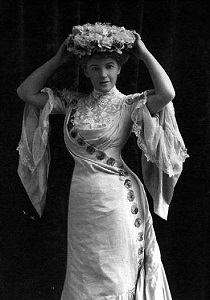
Ella Wheeler Wilcox (5 november 1850 – 30 oktober 1919)
De Duitse dichter en schrijver Hans Sachs werd op 5 november 1494 in Nürnberg geboren als zoon van een kleermaker. Zie ook mijn blog van 5 november 2010 en eveneens alle tags voor Hans Sachs op dit blog.
Die bitter lieb (Fragment)
Sie sprach: »weißt nicht mein treuen mute?
ich hab gewagt leib, er und gute
mit dir, ist das ietzunt mein lon?«
der jüngling sprach: »herzlieb, verschon!
der argwon bracht mich auf das spore,
weil ich dich nicht sach oft als vore.«
Das freulein sprach; »der klaffer vile,
die sehen uns gnau auf das spile,
ob ich dich bei der nacht vernim;
oder ich hör zu nacht dein stim,
zum fenster darf ich nicht aussehen,
förcht auch, dir möcht etwas geschehen.«
Er sprach: »nechten wars mir nit weit,
es jagten mich um mettenzeit
mit bloßer wer die schergenhaufe
eben gleich für dein tür heraufe.«
sie sprach: »erst machst mir sorge mer.
unglück reit mich, wo ich hin ker.
mein man wil mir auch nit vertrauen
und tut gar eben auf mich schauen.«
Der jüngling sprach: »merkt es dein mane,
erst bleib ich nit; ich wil darvane!
es kostet mein und deinen leib.«
erst wart betrübt das zarte weib
und umfing den jüngling mit armen,
sprach: »bleib und tu dich mein erbarmen!«
Der knab tet wider zu ir jehen:
»dein brüder mich tückisch ansehen,
als ob sie merken unser lieb;
nit gut wer, das ich lenger blieb.«
darmit das freulein er umfinge,
nam urlaub, traurig von ir ginge;
Die wand ir hend und rauft ir har.
da dacht ich mir: und ist das war,
das in der süßen lieb verborgen
ligt so vil ungelücks und sorgen,
klag, eifersucht und klafferei,
senen und trauren mancherlei,
ich geschweig des letzten abscheiden,
so wil die bitter lieb ich meiden.
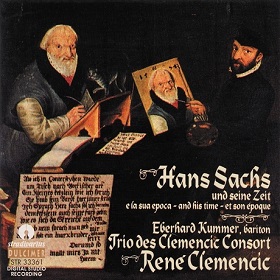
Hans Sachs (5 november 1494 -19 janauari 1576)
Cover DVD
De Duitse schrijfster, uitgeefster en actrice Ulla Berkéwicz werd geboren op 5 november 1948 in Gießen als Ursula Schmidt. Zie ook alle tags voor Ulla Berkéwicz en ook mijn blog van 5 november 2009 en ook mijn blog van 5 november 2010.
Uit: Überlebnis
„Die Klinkerkliniken standen am Berg, in den Krankengängen roch es nach Wunden und Desinfektion, nach Schwesternkaffee und Hackbraten. Ich tanzte und ich sang, bis die Sterber starben, dann saß ich still, um ihre Stille nicht zu stören, gab meine Hand und wartete auf den Spalt, von dem die Großmutter mir erzählt hatte, daß er aufreißt, wenn einer stirbt, mitten hineinreißt in das Gefüge hier.”
Die Kindheits- und Jugenderinnerungen prägen ihr Bild vom Sterben und fügen sich gut in das Buch, da uns die Erfahrung von Tod und Trauer alte Kinderfragen immer wieder neu stellen lässt: “Wohin gehen die Toten?” oder wie es in dem Buch heißt: “Was geschieht mit den Toten?”. In fünf Akten, plus einer Vor- wie einer Nachrede, umkreist Berkéwicz ihren Gegenstand. Die stärksten Augenblicke gelingen ihr in ihren atmosphärisch und sprachlich ungeheuer dichten Krankenhausszenen, in denen die Erzählerin nicht von der Seite ihres Mannes weicht, das Personal nervt und sich selbst an die eigenen Grenzen bringt.
“Ein Warteraum für Angehörige, ein Angst-Schock-Horror-Raum. Ein Raum, in dem die kahlen Wände sich vor Schrecken biegen, in dem es nach der Scheiße stinkt, die nebenan im Plastikklo, wo sich die Angehörigen die Angst, den Schock, den Horror aus dem Leib rausscheißen, in allen Ritzen hängt. Es ist heiß. Die Heizung ist nicht abzustellen. Draußen brütet die Pfingsthitze giftige Fliegen aus. Ein rohes Sofa, ein Tisch, ein Gummibaum. ‘Rauchen verboten’ steht an der Wand. ‘Öffnen verboten’ steht am Fenster. Ich nehme einen grünen Kittel von einem Kittelstapel. Es hat geheißen, ich muß warten, bis er untersucht ist, es hat geheißen, ich muß einen grünen Kittel überziehen.Leute in weißen Kitteln rennen an der Tür vorbei durch eine Tür, an der ‘Eintritt verboten’ steht. Nach Stunden kommt ein Pfleger, plärrt, er sei Pfleger hier, gibt einen Code ein in die Tür, die summt, fährt auf, der Pfleger stößt mich. Einer, der in ein schwarzes Loch fällt, erblickt vor sich ein bisher unsichtbares Universum und büßt im selben Augenblick jede Möglichkeit ein, sich mit denen, die draußen geblieben sind, zu verständigen. Ist das der Tod? Nein, die Intensivstation.”
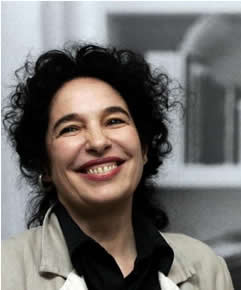
Ulla Unseld-Berkéwicz (Gießen, 5 november 1948)
De Russische schrijver Mikhail Artsybashev werd geboren op 5 november 1878 in Dubroslavovka. Zie ook alle tags voor Mikhail Artsybashev op dit blogen ook mijn blog van 5 november 2009 en ook mijn blog van 5 november 2010.
Uit: Breaking Point (Vertaald door Percy Pinkerton)
“The little town lay in the Steppes, and beyond its outskirts, beyond the vibrating air of the distant country-side, lay the intangible depths of the horizon of towering forests and the remote indifferent sky. It was easy here to realise the vanity and futility of the handful of human beings who lived, suffered, and died in the place. In summer the sun burnt ceaselessly down on the Steppes, and in winter they were wrapped in a cold smooth shroud. During the hot nights the clouds collected in masses and the thunder rolled ceremoniously from one end of their vast blackness to the other. But at all times the Steppes were equally oppressive, strange and mysterious. When it was windy columns of dust rose from the plains and blew straight down on the town, like a funeral procession of grey ghosts. Noiselessly they settled on the roofs and windows of the houses, on the stagnant waters of the river, and covered the whole town with a soft unresisting veil. And then the place looked old and decrepit, like the world. Everything was as formless and insignificant as a heap of ashes before the wind scatters them. It is in such a grey hamlet, rather than among blossoming trees, sunlit mountain-peaks, the azure of the sky, or in the midst of cities that those terrible thoughts must be born which later enter the world to creep across her face like the pale portentous ghost of death. A rock flung into the sea vanishes to leave no trace, but a . mall stone, tolling into shallow stagnant water creates its inevitable circles in every direction. And what passed unheeded that day in the midst of life was to stir souls to their depths in that little town. Naumoff, the new engineer at the factories of Arbusoff the local capitalist, may be said to have caused the whole trouble. Perhaps the shadow which this sinister being had cast upon life was really significant in the speedy development of affairs. »
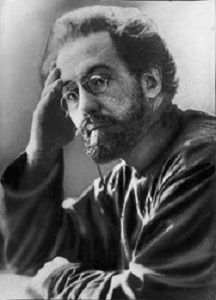
Mikhail Artsybashev (5 november 1878 – 3 maart 1927)
De Engelse dichter en schrijver James Elroy Flecker werd geboren op 5 november 1884 in Londen. Zie ook alle tags voor James Elroy Flecker op dit blog en ook mijn blog van 5 november 2009 en ook mijn blog van 5 november 2010.
The Ballad Of The Student In The South
It was no sooner than this morn
That first I found you there,
Deep in a field of southern corn
As golden as your hair.
I had read books you had not read,
Yet I was put to shame
To hear the simple words you said,
And see your eyes aflame.
Shall I forget when prying dawn
Sends me about my way,
The careless stars, the quiet lawn,
And you with whom I lay?
Your’s is the beauty of the moon,
The wisdom of the sea,
Since first you tasted, sweet and soon,
Of God’s forbidden tree.
Darling, a scholar’s fancies sink
So faint beneath your song;
And you are right, why should we think,
We who are young and strong?
For we are simple, you and I,
We do what others do,
Linger and toil and laugh and die
And love the whole night through.
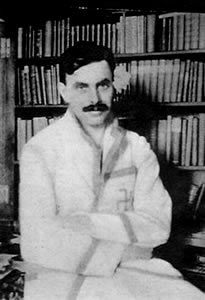
James Elroy Flecker (5 november 1884 – 3 januari 1915)
De Amerikaanse schilder en dichter Washington Allston werd geboren op 5 november 1779 in de buurt van Charleston, South Carolina. Zie ook alle tags voor Washington Allston op dit blog en ook mijn blog van 5 november 2009 en ook mijn blog van 5 november 2010.
On The Statue Of An Angel, By Bienaimé, Of Rome, In The Possession Of J. S. Copley Green, Esq.
Oh, who can look on that celestial face,
And kindred for it claim with aught on earth?
If ever here more lovely form had birth-
No-never that supernal purity-that grace
So eloquent of unimpassioned love!
That, by a simple movement, thus imparts
Its own harmonious peace, the while our hearts
Rise, as by instinct, to the world above.
And yet we look on cold, unconscious stone.
But what is that which thus our spirits own
As Truth and Life? ‘Tis not material Art-
But e’en the Sculptor’s soul to sense unseal’d.
Oh, never may he doubt-its witness so reveal’d-
There lives within him an immortal part.
Washington Allston (5 november 1779 – 9 juli 1843)
De beschermengel door Luigi Bienaimé
Zie voor bovenstaande schrijvers ook mijn blog van 5 november 2008, en ook mijn blog van 5 november 2007 en eveneens mijn blog van 5 november 2006.
